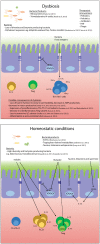Novel perspectives on therapeutic modulation of the gut microbiota
- PMID: 27366225
- PMCID: PMC4913331
- DOI: 10.1177/1756283X16637819
Novel perspectives on therapeutic modulation of the gut microbiota
Abstract
The gut microbiota contributes to the maintenance of health and, when disrupted, may drive gastrointestinal and extragastrointestinal disease. This can occur through direct pathways such as interaction with the epithelial barrier and mucosal immune system or indirectly via production of metabolites. There is no current curative therapy for chronic inflammatory conditions such as inflammatory bowel disease, which are complex multifactorial disorders involving genetic predisposition, and environmental triggers. Therapies are directed to suppress inflammation rather than the driver, and these approaches are not devoid of adverse effects. Therefore, there is great interest in modulation of the gut microbiota to provide protection from disease. Interventions that modulate the microbiota include diet, probiotics and more recently the emergence of experimental therapies such as fecal microbiota transplant or phage therapy. Emerging data indicate that certain bacteria can induce protective immune responses and enhance intestinal barrier function, which could be potential therapeutic targets. However, mechanistic links and specific therapeutic recommendations are still lacking. Here we provide a pathophysiological overview of potential therapeutic applications of the gut microbiota.
Keywords: fecal microbiota transplant; inflammatory bowel disease; irritable bowel syndrome; microbiota; prebiotics; probiotics.
Conflict of interest statement
Figures

References
-
- Atarashi K., Tanoue T., Oshima K., Suda W., Nagano Y., Nishikawa H., et al. (2013) Treg induction by a rationally selected mixture of Clostridia strains from the human microbiota. Nature 500: 232–236. - PubMed
Publication types
LinkOut - more resources
Full Text Sources
Other Literature Sources

